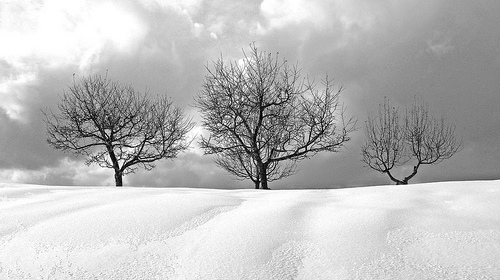MOTHER LOAD
From the very beginning
The burden was clear
Sometimes bearable
Sometimes severe
Ate from the apple
Shared it with him
Disobeyed the order
Indulged the whim.
What was the outcome?
The fruit of the act?
She ‘knew’ good and evil?
She experienced it in fact?
Did the earth creature join her?
Did he crumble into dust?
Did he die in an instant?
Or just tumble into lust?
To love and to cherish
Becomes ‘desire and dominate’
Objectify the ‘other’
So you can subjugate.
Suddenly self conscious
Instantly aware
There are no coverings
Only nakedness there.
Hiding in the garden,
The creature in shame
Running from her Maker
Like some kind of game.
Passing the blame on
From God to the wife,
From the wife to the snake
‘The’ creator of strife.
Banished from the garden,
But clothed by their God
Not allowed to live forever
Find a living from the sod
Pain in her labor
Shortness of breath
The mother of all living
Gives birth near to death
And would she be able
To raise Cain at all?
Or will her next offspring
Be first to fall?
And how to redeem this?
Set the process in reverse
Put a stop to the death toll
Undoing the curse?
II
From the very beginning
The burden was clear
“Be it unto me as you said,
The Lord’s servant is here.”
A virginal conception
Had a child without a man
Which no one expected
And few would understand.
She received a word of warning
A sword would pierce her soul
But the death of her first born
Would make the race whole.
There beneath a crooked tree
Stood that woman and a man
Neither disobeyed the orders
Each accepting the plan.
Then He rose in the garden
Reopened its gate
To the tree for the living
To the Adam without mate.
And there in the Scriptures
Was a promise true and sure
“She’ll be saved through the childbearing”
That Mary did endure.
The story revisited
The human tale revised
Motherlode now delivered
Curse reversed before our eyes.
Dec. 20th 2005
For Brian, Lawson, Sandy, Bill, and David
THEOLOGICAL MUSINGS
It has long been the case that Christians, including theologians have compared and contrasted the stories of Eve and Mary, just as they have contrasted the stories of the first and the last Adams, Jesus being the last one. No descendants could into the world without Eve, the mother of all living, and no one could come into the world to come without Mary, the mother of the messiah. Sometimes even the church fathers resorted to typology or allegory to find connections between the stories of Eve and Mary. For example Eve beneath the tree with the fruit and the snake, is seen as like Mary beneath the cross, only Eve listened to the serpent and disobeyed God, while Mary listened to her Son and obeyed his words. There is then considerable precedent for the kind of comparisons and contrasts that are going on in this poem.
One of the things I was exploring and trying to probe in this poem is the burden that women have always borne since the beginning of humankind, and by this I do not just mean bearing the burden of childbearing, though that is no small task in itself. I referring to the fact that women have tended to be viewed as either like Eve or Mary, with nothing much in between. From deceived by a serpent to believing an angel women have been seen as either sirens or saints. This has been quite a burden to bear, to say the least, and it is unfair. But there is more. Mary had the additional burden of not only being the mother of a controversial messianic figure who came into this world in an irregular manner, but she was warned as well that Jesus would leave the world in a shocking manner as well.
The correspondences between these stories underline a few dominant Scriptural themes: 1) God is a God of second chances but 2) on the second go around it is none other than his Son that makes sure that the human tale is set right and will have a happy ending. In other words, God takes matters into his own hands, and yet all hangs on a Jewish maiden saying “be it unto to me as you have said, I am the handmaiden of the Lord.” Human response to the divine initiative is neither pre-empted nor pre-determined. The curse was reversed through an obedient woman just as the curse was initiated by a disobedient one. The human drama involves both divine and human decisions, and women have as much to do with salvation as they do with fallenness. In fact, the author of 1 Tim. 2.8-15 is prepared to remind us that “women shall be saved through the Childbearing”, an oblique reference to the birth of Jesus. But none of this story would have turned out well if God had not raised Jesus from the dead. All the obedience in the world cannot produce divine grace or salvation. Only the divine activity itself can produce such an outcome. Resurrection is not the outcome of a human self-help program. One then must give God the glory, while still giving Mary her due.













